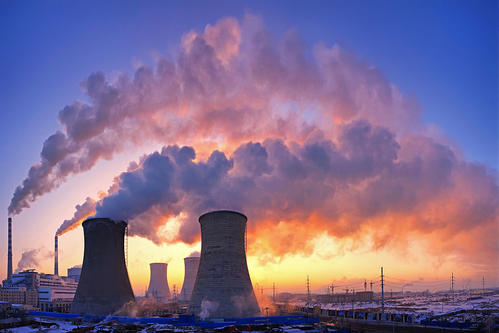Polish energy companies Enea and Energa late on May 19 announced they were ending their involvement with construction of the Ostroleka C coal-fired power plant, after new co-owner PKN Orlen said it would not be involved in the project if it utilizes coal.

PKN Orlen, a Poland state-owned energy company that recently acquired Energa, said it would only be involved if the 1-GW project were pursued as a gas-fired plant. PKN Orlen announced its acquisition of Energa in December 2019, and at the time the company—Poland’s biggest oil refiner—said it might convert Ostroleka C to generate power with natural gas.
Enea and Energa said they each would take a write-down of PLN 0.5 billion (about $121 million U.S.) for pulling out of the project. General Electric (GE) has served as the lead contractor for the plant’s construction.
The Ostroleka C plant has struggled to find financial support and has been criticized by several groups who cautioned it could not be financially viable using coal for power generation. Enea and Energa in February said they would suspend their financing of the project, presumably with the hope of finding outside investors to help finish construction.
Shareholder Lawsuit
Enea in 2019 lost a court battle brought by shareholder ClientEarth, which said the financial risks of the project were “indefensible.” ClientEarth lawyer Peter Barnett said Tuesday’s action by Enea and Energa sends a message that investments in coal-fired power generation in Europe are not wise.
“This underlines that stranded asset risk is not a theoretical concern,” said Barnett. “This project was never viable, whether from a financial or a climate perspective, as its sponsors were repeatedly warned. Investors are fleeing coal and Ostrolęka C is just the latest example of wasted shareholder funds that could have been invested in cleaner, lower-cost renewables.”
Barnett noted higher European Union prices for carbon, lower costs for renewable power, and the fact several global banks have or will end support for coal projects, made the Polish plant project untenable.
“Companies and their directors are legally accountable to shareholders—and that means factoring in the financial risks and opportunities of the transition to a zero-carbon economy,” Barnett said. “Clean technology, climate policy and climate litigation are becoming ever greater drivers of value and large-scale fossil fuel investment is increasingly fraught with financial and legal risk.”
Legal & General Investment Management (LGIM), a global investment firm and shareholder of both Energa and Enea, in October 2019 said it was concerned about the risk associated with the $1.6 Ostroleka C plant. At the time, Meryam Omi, head of sustainability and responsible investment strategy at LGIM, told Reuters, “We have serious concerns about the development of a new coal plant in Poland, Ostroleka C given that they have not yet secured capacity market payments or confirmed third-party financing. As an index manager, we are by default invested in Energa and Enea, and therefore our clients are exposed to very high financial risks due its uncertain policy support, rising carbon prices, unreliable capacity payments and threat of new technologies in energy generation.”
GE Had EPC Lead on Project
General Electric (GE) had signed on as the engineering, procurement, and commissioning (EPC) contractor for Ostrołęka C. GE described the plant as an ultra-supercritical facility, and said “Ostrołęka C will reach the highest efficiency level possible in Poland with 46%. It translates into less fuel burn, with more efficiency and more power. In comparison to the global average of 33%, that represents a 26% reduction of CO2 per MW produced.”
GE had said the plant “is specifically designed” to provide flexible, baseload power, “and will have faster start-up and ramp-up times to securely deliver energy to Polish cities when the sun stops shining and the winds blowing. With 1,000 MW of power output, Ostrołęka C has the capacity to back-up more than 330 wind turbines or 20,000 solar panels.”
A spokesperson for GE said comment about the project would come from the company’s Steam Power team in Switzerland. That group was not immediately available.